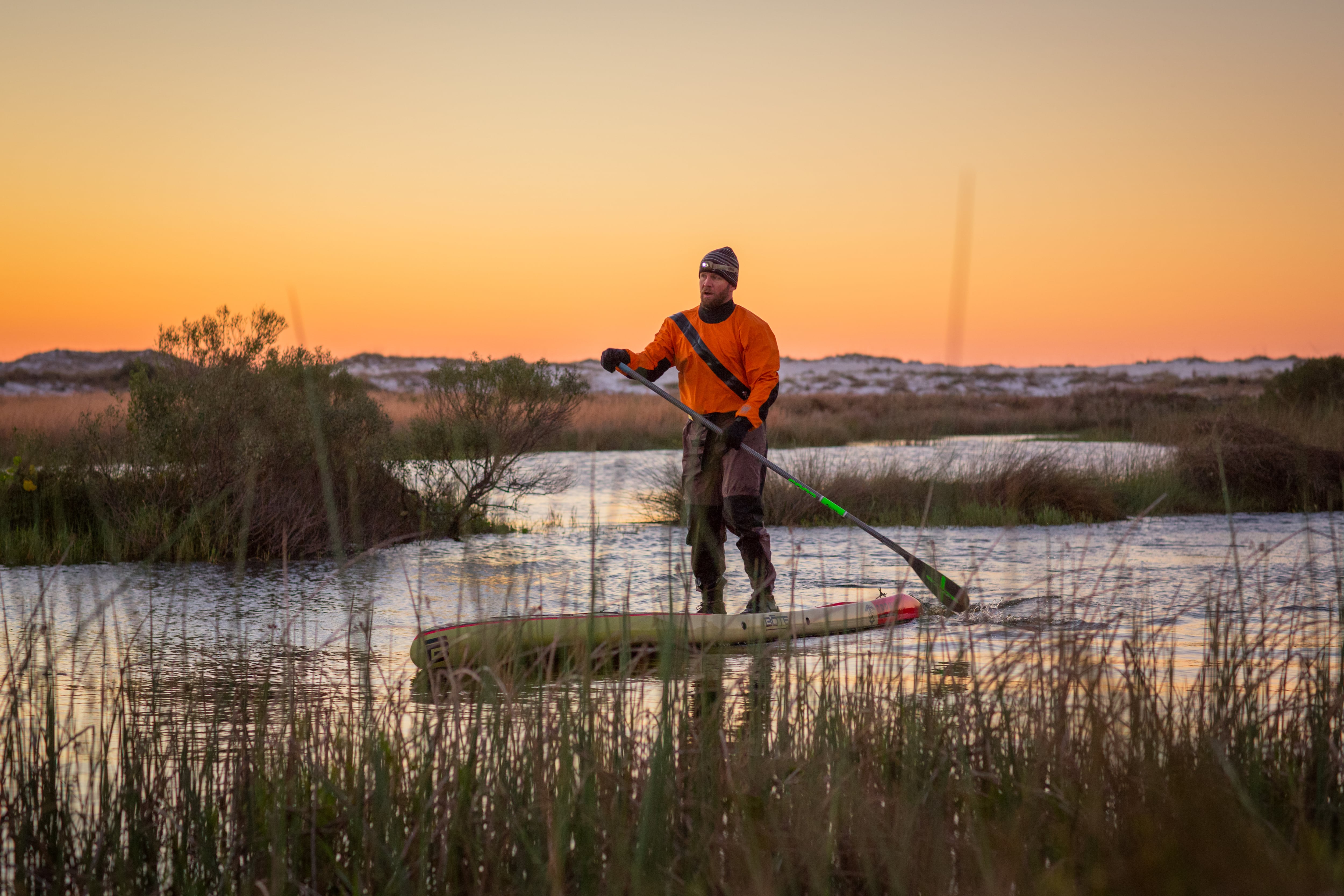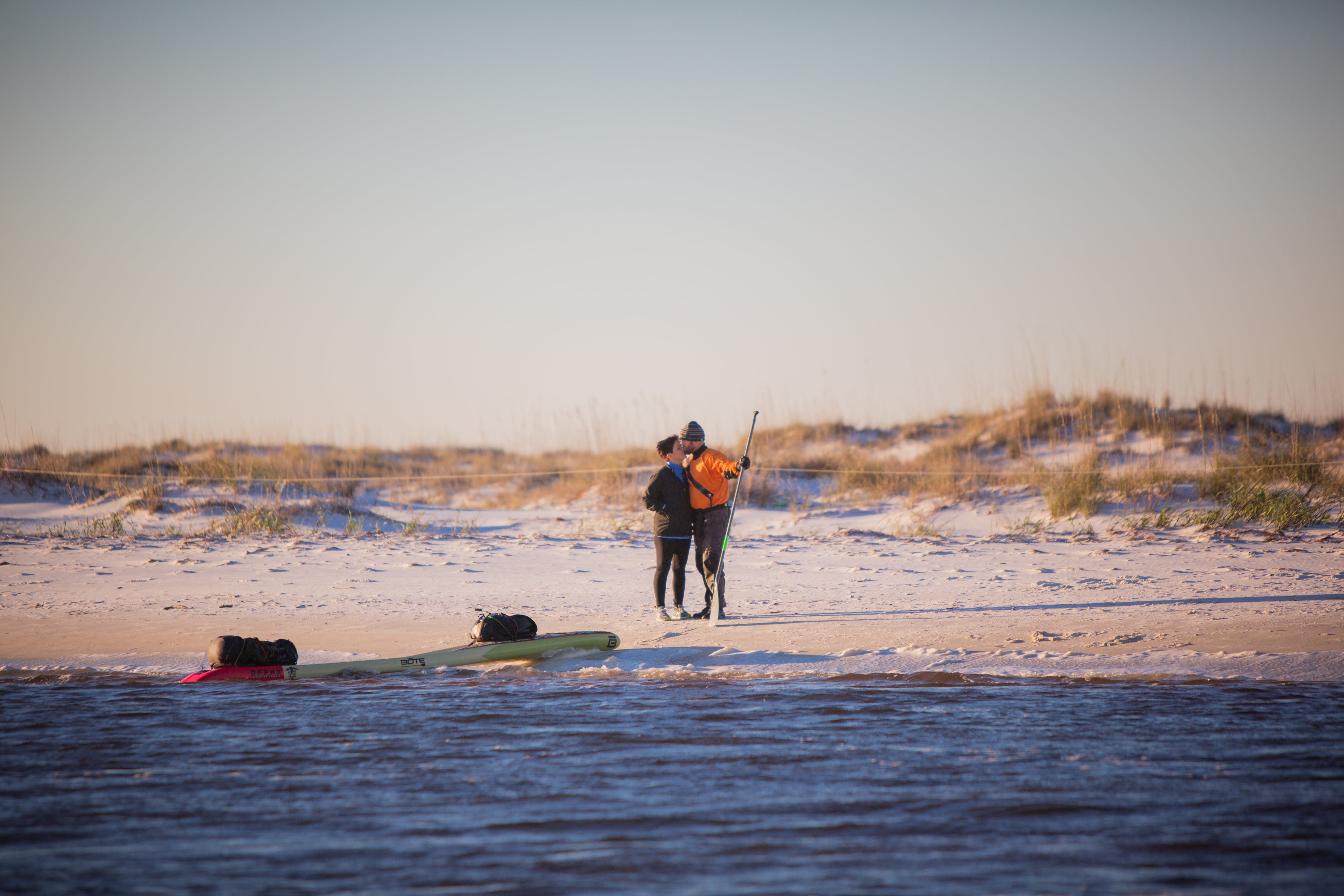Balancing on a paddleboard helps retired Sgt. 1st Class Josh Collins feel stable.
After 20 years in Army special operations, including Delta Force, and five years as a contractor, the injuries Collins sustained began to take their toll on his body. Along with the prescriptions from his doctor, Collins was self-medicated with alcohol.
In 2014, he was hospitalized at the James A. Haley Veterans Hospital Polytrauma Rehabilitation Center in Tampa, Florida, for three months.
"Everything related to balance in my head is messed up," he said. "I live in a constant state of movement and vertigo."
But when he got on a paddleboard during a recreational therapy event at the VA, "literally the world stood still."
"It's like being in a dungeon for 10 years, and all of a sudden the light's popping up," he said. "It made sense because … when I was just standing normally, I would kind of weave back and forth."
Collins said his wife, Tonia, gave him a paddleboard soon after, and they rented a house on the water in Florida.
As Collins began to recover and pick up the pieces of his career and family, he thought about how he was going to get his life back.
"I wanted to do something epic to raise awareness to kind of show that with TBI and going through all the things that I went through and complete life crash, that someone can come back," he said.
Originally, Collins wanted to row around the world, but a friend suggested he start with something a little more down-to-earth and build credibility first.
So he decided to stand-up paddleboard from Corpus Christi, Texas, to New York City — 3,500 miles. His plan is to end in New York in July. You can track his journey here.
Collins said he paddleboards 30-40 miles a day with a big bag of trail mix at his feet.
"The things that really hurt are my hands — my hands ache all day long," he said.
The heat, solitude and danger — from both weather and wildlife — can get to him, but he wants his journey to symbolize the struggle veterans face after service and combat.

Josh Collins wants his journey to represent the struggle veterans face when transitioning out of the military.
Photo Credit: Romona Robbins Photography
Finding treatment
Besides showing others that it's possible to come back from their darkest hour, Collins is raising money for the Task Force Dagger Foundation, which helped him during his rehabilitation.
Collins said the foundation flew his wife to Tampa every two weeks so they could spend time together when he was in the hospital and helped the couple move to Florida when he left the center so he could be near his doctors.
The biggest help the foundation provided was alternative treatments that didn't involve pills, he said.
"Those are the things that have really worked."
Keith David, a former Green Beret and Task Force Dagger Foundation managing director, said the foundation looks for nonpharmaceutical treatment methods as much as possible.
These treatments include magnetic resonance therapy, using magnetic waves near where magnets are strategically implanted placed in areas of the brain that are not functioning properly in order to rejuvenate the neural pathways, similar to MRI technology. Another is LED therapy, applying which applies infrared and near-infrared light to the scalp to improve blood flow in the brain. that location.
The foundation, which focuses on members of the military’s special-operations community, also teaches service members how to take better care of their bodies and heal through recreational therapy, such as paddleboarding.
David said the foundation takes family members into account, as well.
"We're one of the few organizations where if the service member is not wounded but they have a family member who needs something, we help out," he said. "So far this year, we've helped out 450 families."
Collins’ goal is to raise enough money for the roughly 7,500 U.S. Special Operations Command troops and veterans members who are wounded and could benefit from the same treatment Collins received.
"These are not things they can get through the VA or Tricare or anything else," he said. "These treatments changed my life and got me where I am today."
The goal is to raise $22 million eventually and, according to David, $157,000 has been raised through Collins.
Collins is sponsored by BOTE paddleboards, which is raffling off 12 replicas of the same board he's using. Tickets can be purchased online for $20; the money will go to the Task Force Dagger Foundation, and the boards will be shipped to the winners.

Josh's wife, Tonia, is supporting him through his 3,500-mile journey.
Photo Credit: Romona Robbins Photography
Beyond Josh
Both Collins and David credit Tonia Collins as an integral part of the journey.
Collins said his wife follows him in an RV, and at night they park near a Walmart or an RV park if they can find one.
"If I'm not nice, she won't pick me up," he said jokingly.
"Since Josh's injuries and his time in the VA, I've been his 100 percent caregiver," she said. "We just decided to spend our time together and devote our time to each other and our family."
She said it's a daily challenge figuring out the logistics of the trip, especially where they're going to stop at night, but the community has been very supportive.
"They bring water to [Josh], just to show their support," she said. "You don't know that people really recognize you, but I guess if there's a paddleboard with an American flag and Task Force Dagger flag ..."
There are also rally points along the route where people can paddle up to Collins and hang out.
"I don't think it's all about Josh," Tonia Collins said. "It's that you can also do this. That you can get past all of the stigmas of post-traumatic stress."
One of these rally points has a bigger purpose.
Collins said he's taking a 120-mile detour up the Potomac River to stop in Washington, D.C., on June 25 to raise more awareness of the challenges veterans face dealing with post-traumatic stress. He's hoping for legislation that will help ease the their struggles.
"If you ask a lot of guys, they don't want the stigma and brand of PTSD," Collins said. "Three months earlier I was trusted with the nation's secrets, and now I have this disorder."
He said some vets won't try to get help because they don't want that stigma and they're afraid they'll lose their security clearance, job or Second Amendment rights.
"I'm trying to be a crash-test dummy that returns to work," he said. "There are [treatments] out there that don't have to do with prescription drugs, and they work and they get people better and you move on with your life."
Charlsy Panzino covers veterans education, employment and transition issues, as well as travel, entertainment and fitness. Email her at cpanzino@militarytimes.com.
Charlsy is a Reporter and Engagement Manager for Military Times. Email her at cpanzino@militarytimes.com.





